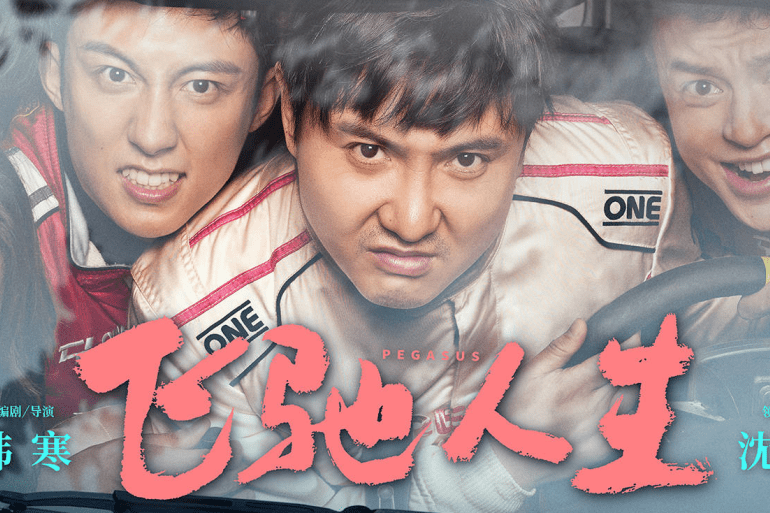With all eyes on the outrageous sci-fi blockbuster, The Wandering Earth, during the Chinese New Year holiday season, a film like Pegasus could get lost amidst the debris of the expensive disaster movie spectacle. But director Han Han brings name recognition to the project; a published author and essayist, Han is also considered the most famous blogger in China and was named one of the most influential people in the world by Time Magazine, appearing on the TIME 100 list in 2010. He has recently turned his attention to filmmaking and Pegasus is his third feature. It might also look like smart counter-programming to release a modestly budgeted sports comedy next to Frant Gwo’s mammoth production, but comedies are a staple of the Chinese New Year movie season and Pegasus will have to compete with other high profile films at the box office, like Crazy Alien and Stephen Chow’s The New King of Comedy (inexplicably not playing in Toronto, a baffling choice given Chow actually has name recognition in the West).
I doubt the film will be overlooked in China, but I humbly submit this review in the hopes that it will not go unseen here.
Pegasus is a tried-and-true comeback story about a disgraced rally driver looking to regain his honor. It’s packed with big laughs, and its success owes a lot to its lead actor, Shen Teng. He shuffles and bumbles his way through the story with a natural charisma, deadpanning and mumbling dialogue with confident yet casual ease; he’s immediately likable and riotously funny. But he couldn’t do it alone, and Han proves he has a knack for comedy, knowing when to sit back and let the actors take charge, when to maximize a gag with a specific camera setup, and when to cut and hit the right comedic beat.
An early scene involving our hero, Zhang Chi (Shen), taking a driving test to reclaim his license, builds on the back-and-forth rhythm between the actors in the car, but the scene as a whole is deftly controlled by Han, a cleverly written setup playing on Zhang’s former celebrity status that culminates in a dramatic reversal, an obvious but expertly timed punchline that left me howling with laughter. Based on my audience’s reactions to the film (and I appreciate that this is as small as sample sizes get), Han has a hit on his hands; everybody in the theatre was laughing uncontrollably during a good many scenes. A quick note for Western audiences, however: There are no subtitles for some of the on-screen text, and there’s a lot of wordplay and cultural references that the subtitles do not attempt to translate. A joke about the name of Zhang’s kid, and the name of other classmates, was completely lost on me, whereas my audience was laughing harder during this scene that just about any other.
Han also sneaks a lot of social commentary into the film, between all the jokes. There’s a great scene involving Zhang and his new rival, Lin Zhendong (Huang Jingyu), meeting at Zhang’s apartment. The reveal that Lin’s company is funding the condo developments that Zhang had just been complaining about is treated as little more than a throwaway gag about the Shanghai skyline, another amusing reversal that adds insult to Zhang’s legal injuries, but it’s also a sly observation on the social and cultural impact of China’s rapidly growing economy. Pegasus does not make any sweeping political statements, but it couches criticism in quotidian observations, small details that tell bigger stories.
This is also evident in the scene’s culmination, which involves Zhang and Lin sharing a bottle of wine; specifically, a bottle of Petrus, a red wine from the Pomerol appellation of France, gifted to Zhang by a friend—and that Zhang proceeds to pour into and drink out of a bowl, claiming there’s no time to let it breathe (I work in the alcohol industry by day, and reader, I cannot begin to tell you how attacked I felt during this scene). Han, however, knows his stuff, and the inevitable reversal is staring you in the face the whole time: The bottle is clearly labeled as a 1991 vintage, which does not exist. It’s a deliberate commentary on the fickle social status afforded by stardom, while incidentally highlighting the notorious role of the black market in alcohol trade (do a google search on whiskey auctions, if you’re bored); money and fame muddle friendships, and appearances are always deceiving.
The film’s biggest misstep is leaning too hard into its routine comeback story in the second half; the laughs are just as big, but grow increasingly infrequent, the film making the inexplicable decision to trade in some of its jokes for dramatic clichés. The story is nothing new and hardly worth the price of admission alone, so it’s a curious choice. However, it’s a gamble that pays off during the final rally race. Pegasus is a comedy first, so there’s no real action or driving sequences until this final scene, but Han pulls out all the stops and delivers a thrilling, engaging sequence. In addition to his other occupations, outlined above, Han is also a professional rally driver, so he’s drawing upon his own knowledge and experiences here. The sequence avoids the most obvious cliché, a third act showdown between rivals, in favor of a more credible depiction of rally racing. Han favors specificity, exploring the minutiae of his sport and guiding the viewer through the details of the track and its turns and hazards, the particular skills of the driver and co-driver, the impact of the environment on the automobiles, how climate and elevation affect performance, etc. Some of this might sound boring on paper, but I found it all interesting and entertaining.
Pegasus tends to work better when taken on a scene by scene basis, rather than as a whole. The ending is abrupt, and while the final image is quite amusing, it’s also an admission that there’s not a lot to the story itself. Han excels at crafting individual moments, and even building jokes over multiple scenes with clever callbacks, but the narrative is a means to an end in this case and the film is sloppily assembled when looking at the overall structure and editing. The limitations of its budget are revealed in some unnecessary CGI sequences (a fantasy sequence goes on far too long, running its one joke into the ground), and the sound mixing is often too soft, robbing scenes of impact. Basically, it’s rough around the edges, but how much that actually bothers you will depend on how long and hard this movie keeps you laughing. Han is probably gambling that he can keep his audience laughing through the rough patches, and for the most part, I’d say he succeeds.
For more coverage of the Chinese New Year movie season, check out Film Era’s reviews for Frant Gwo’s The Wandering Earth and Alan Mak’s Integrity.
To help us continue to create content, please consider supporting us on Patreon.


